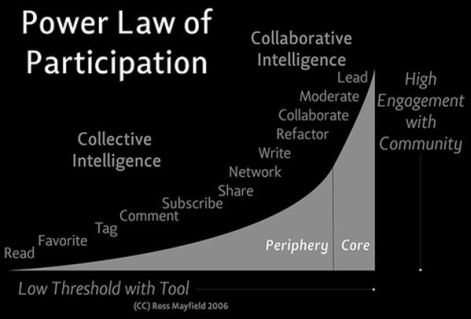I can’t get Howard Rheingold out of my head! His video ’21st Century Literacies’ seems to be on a loop in my head.
• Attention
• Participation
• Collaboration
• Network awareness
• Critical consumption
This is posting is loosely connected to ocTEL activity 2.1 about exploring colleagues readiness to engage with TEL. I haven’t done it as suggested but I did participate in a focus group this week on engagement with our VLE. I didn’t consider it particularly useful to think further about why people didn’t engage (lack of time and skill as a sweeping generalization) but to spend time on what might encourage them to start. As earlier posting on motivation, purpose and mastery clearly have a place but I’m not sure that gets the T-avoider out of the starting blocks. I am interested in the potential of participation as a motivator. This graphic shows a way this participation can build. The social aspect may then encourage further participation to the point of collaboration. Possibly over-optimistic but I like the fact that all forms of participation count.
More on Ross Mayfield’s blog here:
http://ross.typepad.com/blog/2006/04/power_law_of_pa.html
The graphic also illustrates the difference between collective intelligence and creating new collaborative intelligence – but one thing at a time…

In my experience it is almost impossible to get beyond the ‘lack of time’ argument and almost not worthwhile engaging with people on that basis. I am in no way saying that colleagues have loads of time by the way.
Your post got me thinking that it is perhaps not useful to ask people why they don’t engage with VLE but instead involve people in jointly designing learning activities that simply require the VLE or other collaborative tools (many of which will be examples of TEL). As you point out participation is a great motivator and perhaps we need to think more about how we develop opportunities for participation for staff/students rather than asking individuals to develop their VLE module…
Yes I think activity would help. If it was well supported it would get more out of the starting blocks with some tools. Just some small steps in the direction of TEL via ‘have a go’ sessions. This is really what the learning bytes sessions do but only for the enthusiasts. Perhaps if they were restructured – this is what others have done / have a go (supported session) / feedback their impact could be increased? I am still wondering how you get people to attend in the first place though – it must be better to do these sessions with colleagues. This then shares the load, offers encouragement, makes a change more likely through a broader ‘buy-in’, has potential to build momentum.
Getting people involved (particularly those that dont want to) is probably the hardest aspect of TEL.
I made this Hierarchy as a handy checklist to see if a particular project was likely to work
https://docs.google.com/presentation/d/1NdthXrJ0QNrp3viSczeFf3V4AJUKXvKJsTr_91kPvew/edit?usp=sharing
Its the training/cultural level where most of us are working and changing culture is normally difficult
Great post and a really useful graph I think. thanks Jo. It strikes me also that you need the right medium to facilitate the participatory activities that are shown on the Power Law graph. VLEs don’t have them. Also that you need either a shared sense of purpose and a goal oriented community or an engaging /identity oriented community to get people participating.
Thanks Cheryl – I got to a concluding thought of ‘communities of practice’ on the walk in today. Why do we join in (or not)? So your comments on establishing a shared sense of purpose are helpful to me, thanks
Yes, the Lave and Wenger stuff does have some applicability to online community. I think there’s also something on this by Robert Kraut who’s done lots of work on what makes an online community thrive and he talks about successful ones as of one of two types – ‘bond based’ and ‘identity based’ with different strategies appropriate to each…